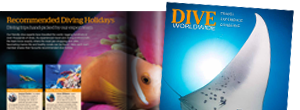Ground-breaking Whale Shark Research For Divers

Dive Sales Consultant Anna Williams shares an exciting update on whale shark research following the Galapagos Conservation Trust event earlier this year, and reveals how you can participate in citizen science on our group diving holiday to the Galapagos.
In June, I was lucky enough to attend a gathering of the Galapagos Conservation Trust (GCT), the only UK-registered charity to focus on the conservation and sustainable development of the Galapagos and its biodiversity.
The GCT collaborates with the incredible Galapagos Whale Shark Project (GWSP), which has spearheaded whale shark research and conservation in the Galapagos since the 1990s. Project Founder, Jonathan R Green, and his daughter Sofía Green Iturralde (Research Scientist and Data Analyst) were only in the UK for a week. They revealed that the team has discovered over 90 per cent of the whale sharks around Wolf & Darwin Islands are female, which provides them with the unique opportunity to study whale shark reproduction.
 The mysteries of why this is, why are primarily adult females travelling through the Galapagos? Are they pregnant? Where the pregnant whale sharks give birth - since the pups haven’t been sighted - where the males are, and where the whale sharks all travel to, make up much of GWSP’s research.
The mysteries of why this is, why are primarily adult females travelling through the Galapagos? Are they pregnant? Where the pregnant whale sharks give birth - since the pups haven’t been sighted - where the males are, and where the whale sharks all travel to, make up much of GWSP’s research.
From satellite tagging, compiling a photo ID database of the whale shark “fingerprint” (each shark has a unique dot and swirl pattern), sampling tissue to better understand a myriad of genetic questions, and drawing blood which helps the team to understand whale shark health and reproduction, the project has directly contributed to much of the knowledge we now have about these amazing animals.
 This ground-breaking data has exciting potential for us divers: it could give us better knowledge about whale shark movements. Recently, whale sharks have been discovered in the South earlier in the season, moving north after June. The research suggests that this could be related to the lunar cycle.
This ground-breaking data has exciting potential for us divers: it could give us better knowledge about whale shark movements. Recently, whale sharks have been discovered in the South earlier in the season, moving north after June. The research suggests that this could be related to the lunar cycle.
 The project has also confirmed that whale sharks move up to the Cocos Islands – research that has contributed to the creation of the new Hermandad Marine Reserve, a massive “no take zone” or “whale shark superswimway” between the Galapagos protected area and Costa Rica and the Cocos Islands.
The project has also confirmed that whale sharks move up to the Cocos Islands – research that has contributed to the creation of the new Hermandad Marine Reserve, a massive “no take zone” or “whale shark superswimway” between the Galapagos protected area and Costa Rica and the Cocos Islands.
 If this all sounds interesting, Sofía Green Iturralde will be leading our exclusive Galapagos Whale Shark Expedition.
If this all sounds interesting, Sofía Green Iturralde will be leading our exclusive Galapagos Whale Shark Expedition.
We caught up with Sofia after the event, and she shared further details on what to expect on this extra special trip:
Undergo a unique dive expedition in September 2024. Throughout our trip we will contribute to conservation efforts through citizen science, learn more about the incredible marine biodiversity of the Galapagos Islands and the efforts undergoing to protect them through a series of lectures on board, and experience some of the best diving of our lives. During the week we will dive at the best sites of the Galapagos in search of sea lions, manta rays, a variety of sharks, molas, and of course, the magnificent whale shark! Join me for the trip of a lifetime.
Galapagos whale shark images by Sofia & Jonathan Green
Contact our expert team to find out more, or join Sofia on our Galapagos Whale Shark Expedition.








